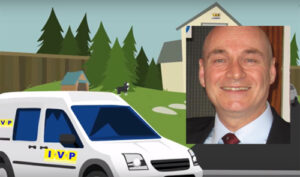 With 31 years in security, Mark Eyles-Thomas is the Managing Director at Integrated Visual Protection in Charlton, London. Areas of expertise for the company cover static guarding (incorporating mobile patrols, key-holding and response services), ARC/RVRC/SOC monitoring services, design, installation and maintenance of access control, alarm and fire security systems
With 31 years in security, Mark Eyles-Thomas is the Managing Director at Integrated Visual Protection in Charlton, London. Areas of expertise for the company cover static guarding (incorporating mobile patrols, key-holding and response services), ARC/RVRC/SOC monitoring services, design, installation and maintenance of access control, alarm and fire security systems
The business has accreditations including four NSI Gold medals (Alarm Receiving Centre, NACOSS, NSI Fire/BAFE and Static Guarding), ACS and ACS Pacesetter – SafeContractor, Chas and Altius.
Do you use a distributor or buy direct from manufacturers?
We are open-minded and will buy from both distributors and manufacturers. In addition we will openly engage with manufacturers to assist in the beta testing of any of their products, having our own ARC can prove very beneficial in this area. Also being privately owned and not being restricted to any one distributor and/or manufacturer, means we can truly recommend the best equipment/solution for the job.
Quite obviously common sense must prevail and a proven track record, the availability of stock, our engineers’ installation/product knowledge proficiency, any market needs/trends, the supplier relationship, any restrictions on the supply route, value for money/risk ratio, etc., are all factors for consideration and must dovetail with the customer’s demands and specifications.
In short we will not play Russian roulette with any customer design and/or their installation.
Is third party accreditation beneficial to your company?
Third party accreditations are essential to our company. We are a privately owned company that needs to compete effectively in today’s modern market. Our accreditations perform a vital role in ensuring customer confidence and market opportunity and we will continue to seek further accreditations to expand our operations and expertise.
Our internal and external inspections allow us to focus and reflect upon our practices and processes to ensure efficiency and best practice. In addition our wide range of accreditations provides us with the ability to advise and design the best possible security solution for the customer, now that’s an advantage over quite a number of our competitors. We are also advocates for the introduction of business licensing for security companies.
What would be a typical project for you?
Our electronic projects vary dramatically and I would not wish to stereotype our company in any way.
We enjoy the challenges set by the commercial environment as much as we enjoy the demands imposed by the domestic user and will happily apply ourselves accordingly. That said we are contracted by a leading UK high-street supermarket chain and are responsible for the design, installation, commissioning and maintenance of their intruder and fire alarm systems in their high-street stores, offices and warehouses. These systems will usually comprise of 50-70 fire devices and 40-60 security devices, all being designed, installed and commissioned within approximately a four-week period. Our latest fire project however comprises of approximately 580 fire devices for a school, all to be completed within a five-week period.
Our static guarding operations comprise of a variety of blue-chip customers. Hours of operations can vary from customer to customer but in the main these sites are manned 24/7.
Are there any common requests from customers that give you problems?
The most frequent impossible demand is that the customer would like it yesterday at yesterday’s prices! Or a Rolls-Royce for the price of a Mini!
No seriously – with the advancements of smart phones/houses, personal gadgets, IT awareness, etc., customers and/or their purchasing departments are becoming more and more technically savvy and confident and this can be a good thing. Fortunately for us (as security specialists) they do not have the 20 or 30 years practical experience and/or expertise, which can often be the difference between a successful project and a complete nightmare. As Red Adair once said, “If you think it’s expensive to hire a professional to do the job, wait until you hire an amateur” and this is particularly pertinent when considering the very nature of our business and our responsibilities.
Read the full interview in the August 2016 edition of PSI magazine



